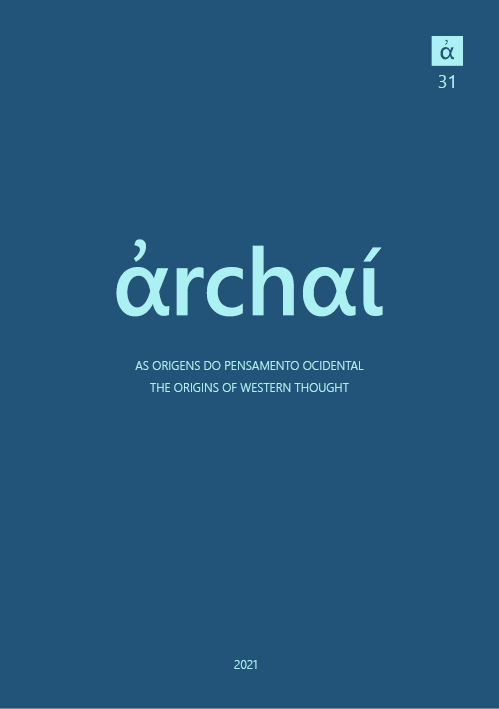Peri tou (me) ontos. Melissus and Gorgias at the ontological crossroad
DOI:
https://doi.org/10.14195/1984-249X_31_21Keywords:
dossier, editorial, PTMOAbstract
Editorial
Downloads
References
ASSATURIAN, S. (2020), What the forms are not: Plato on conceptualism in Parmenides 132b–c. Philosophical Studies 177, p.
–368.
BRÉMOND, M. (2017), Lectures de Mélissos. Édition, traduction et interprétation des témoignages sur Mélissos de Samos.Berlin/Boston,
Walter De Gruyter.
DÍAZ, M. E., SPANGENBERG, P. (2011), Gorgias. Sobre el no ser, traducción de María Elena Díaz y Pilar Spangenberg, estudio introductorio y notas de Pilar Spangenberg, Buenos Aires, Ediciones Winograd.
DI IULIO, E. (2020), Identity’s Sustainability. Parmenides on einai and noein. In: GIOVANNETTI, L. Giovannetti (ed.), The Sustainability of Thought: an itinerary through the history ofphilosophy, Napoli, Bibliopolis, p. 19-43.
GALGANO, N.S., GIOMBINI, S., MARCACCI, F. (eds.) (2020), L. Rossetti et al.: Verso la filosofia: una nuova prospettiva su Parmenide, Zenone e Melisso, Baden Baden, Academia Verlag.
HARRIMAN, B. (2018) Melissus and Eleatic Monism. Cambridge, Cambridge University Press.
IOLI, R. (2010), Gorgia di Lentini. Su ciò che non è, testo greco, traduzione e commento a cura di Roberta Ioli, Hildesheim, Olms.
VOLF, M. (2014), Sophists. Gorgias of Leontini: "On Non-being or On Nature" in contemporarily interpretations, Novosibirsk, Novosibirsk State University.
Downloads
Published
How to Cite
Issue
Section
License
Copyright (c) 2021 Stefania Giombini (Autor); Massimo Pulpito

This work is licensed under a Creative Commons Attribution 4.0 International License.
Given the public access policy of the journal, the use of the published texts is free, with the obligation of recognizing the original authorship and the first publication in this journal. The authors of the published contributions are entirely and exclusively responsible for their contents.
1. The authors authorize the publication of the article in this journal.
2. The authors guarantee that the contribution is original, and take full responsibility for its content in case of impugnation by third parties.
3. The authors guarantee that the contribution is not under evaluation in another journal.
4. The authors keep the copyright and convey to the journal the right of first publication, the work being licensed under a Creative Commons Attribution License-BY.
5. The authors are allowed and stimulated to publicize and distribute their work on-line after the publication in the journal.
6. The authors of the approved works authorize the journal to distribute their content, after publication, for reproduction in content indexes, virtual libraries and similars.
7. The editors reserve the right to make adjustments to the text and to adequate the article to the editorial rules of the journal.



